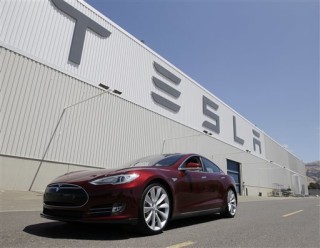10 hours ago

Paul Sakuma / AP
Tesla significantly boosted the number of batteries it plans to buy from Panasonic, enough to power about 80,000 vehicles, over four years.
It’s been a rough month for high-flying Tesla Motors, but despite a pair of fires and several downgrades by industry analysts, the California electric vehicle maker remains upbeat enough to ink a deal that will substantially boost the number of batteries it buys from Japan’s Panasonic Corp.
That, in turn, suggests that Tesla is expecting to sell significantly more of its vehicles than it originally expected. It has already delayed the launch of a second vehicle, the Model X SUV, to catch up on demand for its initial offering, the Model S sedan.
“This expanded agreement with Panasonic is important to Tesla as we continue to increase the pace of production,” the maker’s co-founder and CEO Elon Musk said in a statement Wednesday. “We look forward to strengthening our relationship with Panasonic, and I’m confident that this partnership will continue to be an integral part of Tesla’s success for years to come.”
Under the terms of their agreement, which revises an original 2011 contract, Panasonic will now supply nearly 2 billion automotive-grade lithium-ion battery cells to Tesla during a four-year period. That’s expected to be enough to power about 80,000 vehicles.
Production of the Model S began in July 2012 and has been ramping up this year, with Tesla now expecting to deliver 21,000 of the battery-electric vehicles for all of 2013. The maker originally planned to add the Model X this year but has delayed that until sometime toward the end of 2014. Meanwhile, the maker is expanding its distribution network in Europe and Asia. All told, Tesla hopes to double sales to 40,000 vehicles in 2014.
The Model S has received a wide range of kudos from reviewers, including Consumer Reports magazine, which gave it the magazine’s highest-ever ranking for a vehicle it tested. That helped drive a more than seven-fold surge in Tesla’s stock price, from a 52-week low of $27.37 to a high of $194.50.
But things threatened to unravel earlier this month when a video surfaced on YouTube showing a Model S on fire after its battery pack was struck by metal debris while driving through a Seattle suburb. While the maker quickly downplayed the incident it coincided with negative reports from several analysts who cautioned that Tesla stock was significantly over-priced, sending shares tumbling.
It perhaps didn’t help when CEO Musk declared in an Oct. 24 TV interview that, "The stock price that we have is more than we have any right to deserve. I'm not going to sit here and say we deserve every penny of that.”
Days later, video surfaced of another Tesla Model S fire in Mexico, sending Tesla stock on another slide. At midday Wednesday, Tesla was trading at just under $161 a share, off around $3.50, or 2 percent. Over the past month, however, the stock has dipped by more than $30.
As for consumers, there are no signs yet that the two fires have had any impact on demand. If anything, blogs and chat sites have been largely rich with praise for the fact that both fires were largely limited to small sections at the front of the vehicle due to the way Tesla designed its firewalls.
And the new deal with Panasonic suggests that even if Musk anticipates Tesla stock is due for a slide the CEO doesn’t expect its battery-car sales to run out of power anytime soon.
Related stories:
Government Motors No More — Well, Almost, But Taxpayers to Lose $9.7 bil on GM Bailout
Ford's Little Fiesta Now America's Most Fuel-Efficient Non-Hybrid
A $70,000 Kia? Korean Maker Set to Launch New K900 Luxury Sedan
Copyright © 2009-2013, The Detroit Bureau
Tidak ada komentar:
Posting Komentar